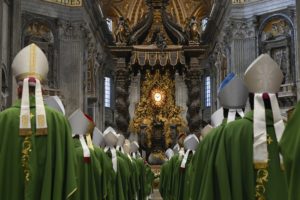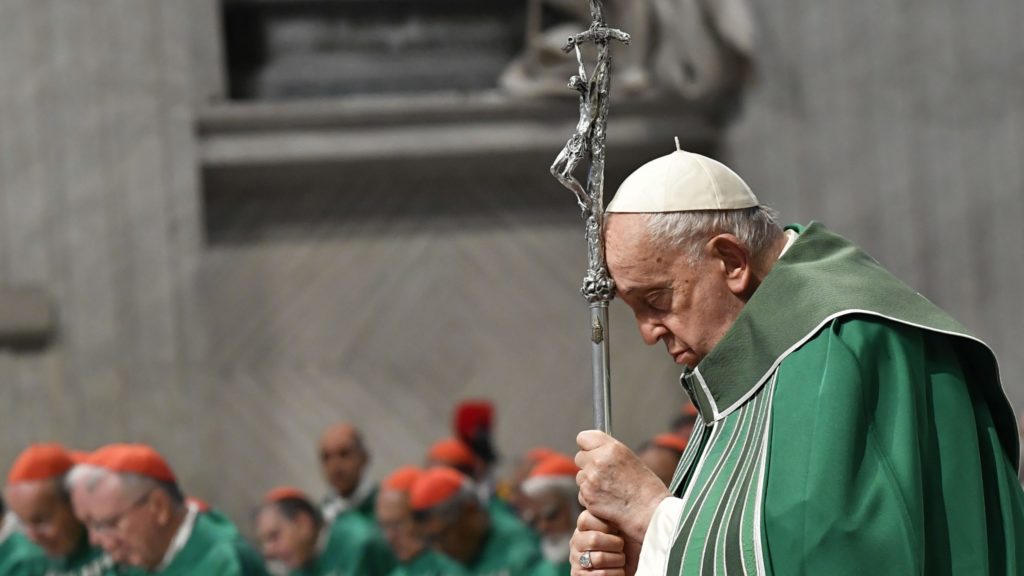The Vatican’s nearly monthlong Synod on Synodality assembly, convened by Pope Francis, concluded with members approving an ambitious text calling for greater “co-responsibility” among all believers in the evangelizing mission of the Church — and proposing concrete reforms to achieve it.
Titled “A Synodal Church in Mission,” the 42-page summary report included notable proposals to establish new ministries for the laity, increase lay involvement in decision-making, create processes to evaluate bishops’ performance of their ministry, change the way the Church discerns “controversial” issues, and expand the footprint of synodal assemblies going forward.
“The exercise of co-responsibility is essential for synodality and is necessary at all levels of the Church,” the final report stated. “Every Christian is a mission in the world.”
The document also repeatedly sought to ground synodality in Scripture, tradition, and the teaching of Vatican II while also affirming the need to further develop the often misunderstood concept itself and apply it more deeply to the Church’s theology and canon law.
The final report itself provided a comprehensive definition of the term.
“Synodality can be understood as the walk of Christians with Christ and toward the kingdom, together with all humanity; mission-oriented, it involves coming together in assembly at the different ecclesial levels of life, listening to one another, dialogue, communal discernment, consensus-building as an expression of Christ’s making himself present alive in the Spirit, and decision-making in differentiated co-responsibility,” it stated.
Many of these themes ran throughout the document’s treatment of 20 different issues, including everything from “Christian initiation” to “missionaries in the digital environment.” The summary report noted areas of convergence, divergence, and concrete proposals that had emerged during the 365 synod members’ discussions on communion, participation, and mission from Oct. 4–28.
“This is the approach of Jesus, to create spaces for everyone so that no one feels excluded,” said Cardinal Mario Grech, head of the secretariat for the synod, during the document’s presentation to media after its publication.
The synod’s report also noted fears that have emerged around the process.
“Some fear that they will be forced to change; others fear that nothing will change and there will be too little courage to move in the rhythm of the living tradition. Some perplexity and opposition also hide the fear of losing power and the privileges that come with it,” the document said.
The assembly also identified the need to determine why some Catholics did not participate in the synodal process, which was initiated by Pope Francis in 2021, and has included consultation at diocesan, national, and continental levels. Only 1% of Catholics worldwide took part.
Controversial issues
The final document was provided to members earlier today after writers attempted to incorporate more than 1,150 proposed amendments into the text. The 344 voting members present approved the text on the evening of Oct. 28, voting to include each paragraph proposed with the required two-thirds majority.
After the final vote, Pope Francis spoke briefly to the assembly, thanking its members and organizers, and telling those gathered that the Holy Spirit is the protagonist of synodal process.
Two sections that received some of the most opposition concerned proposals related to the possible inclusion of women in the diaconate.
Sixty-seven members voted against the proposal that “theological and pastoral research on women’s access to the diaconate should be continued,” taking into account the results of two commissions Pope Francis established to study the topic. “If possible, the results should be presented at the next session of the assembly,” the report proposed.
Sixty-one members opposed a proposal that said a “deeper reflection” on the diaconate’s status as “a proper and permanent degree of the hierarchy” would “also illuminate the issue of women’s access to the diaconate.”
Notably, the final text did not include the term “LGBTQ+ people” after the phrase was included in the working document that guided assembly discussions. The summary report did, however, emphasize the assembly’s “closeness and support to all those who experience a condition of loneliness” as result of “fidelity to the Church’s tradition and magisterium in marriage and sexual ethics” and called upon Christian communities to listen and accompany those in these situations.
Regarding resistance to certain proposals, Cardinal Jean-Claude Hollerich, the relator general of the Synod on Synodality, said that if the results were considered in the context of parliamentary voting in a democratic state, “we would be very happy indeed” with the outcome.
Synodal structures and decision-making
Perhaps the synod’s most significant concrete proposals came in the form of calls for changes in ecclesial decision-making and the expansion of synodal assemblies and bodies in the life of the Church.
The report called for continental assemblies to be canonically recognized and for the implementation of “the exercise of synodality” at regional, national, and continental levels.
One “issue to be addressed” was the revision of local Church councils to “realize through them a greater participation of the people of God.” The recent plenary council in Australia, which included bishop and non-bishop participation, was highlighted as an example to follow.
The synod assembly also proposed formally reconsidering the composition of the Synod of Bishops itself.
In the section on “The Synod of Bishops and Ecclesial Assemblies,” the document said that changes to this year’s synod — most notably, the full participation of non-bishop members, including laymen and women — “were generally welcomed” by the assembly. While “preserving its eminently episcopal character,” the 2023 synod also reportedly “made tangible” the link between the participation of all the faithful, episcopal collegiality, and the primacy of the pope.
“The synodal process was and is a time of grace through which God is offering us the opportunity to experience a new culture of synodality, capable of guiding the life and mission of the Church.”
The text did note, however, that some members raised concerns that the equal participation of non-bishops in an episcopal body could lead to the “specific task of the bishops” not being “adequately understood.”
“The question remains open about the impact of [non-bishops’] presence as full members on the episcopal character of the assembly,” the synod document noted.
The report suggested three options for the arrangement of future global synods: bishops-only, both bishops and non-bishops, or an assembly of non-bishops followed by an episcopal assembly.

The “urgent need to ensure that women can participate in decision-making processes and assume roles of responsibility in pastoral care and ministry” was also cited. The document referenced Pope Francis’ recent appointment of several women to positions of responsibility in the Roman Curia and stressed that “the same should happen at other levels” of the Church and that canon law be adapted accordingly.
The document called for bishops to exercise their mandate to teach, govern, and sanctify through greater engagement with members of their local community. Concrete proposals included establishing “structures and processes for the verification of the bishop’s work” and making diocesan pastoral councils canonically mandatory.
The assembly also called for a review of the criteria used to pick new bishops, incorporating broader consultation in the process, including greater input from laymen and women. And the importance of forming seminarians in a more synodal strain of pastoral engagement was also emphasized.
Ecclesial discernment and ‘open questions’
The assembly also proposed reconsidering the way the Church discerns “controversial” issues and “open questions,” a loaded topic that may raise concerns about the diminishment of the episcopacy’s charism for authoritatively teaching.
“Some issues, such as those related to gender identity and sexual orientation, the end of life, difficult marital situations, and ethical issues related to artificial intelligence, are controversial not only in society but in the Church because they raise new questions,” the document stated.
The report went on to suggest that the Church’s anthropological categories are sometimes “not sufficient to grasp” complexities that emerge through personal experience and scientific inquiry.
As a response, the document called for the promotion of “initiatives that allow for shared discernment on doctrinal, pastoral, and ethical issues that are controversial” in “light of the word of God, Church teaching, theological reflection, and valuing the synod experience.” The text proposed that a confidential meeting of experts on these controversial issues, possibly with the inclusion of those who directly experience them, should be initiated, with an eye toward next October’s assembly.
Relatedly, the document also said that “synodal processes” can verify when the faithful are in consensus (the “consensus fidelium”) on a given issue, which “is a sure criterion for determining whether a particular doctrine or practice belongs to the apostolic faith.”
While Catholic teaching affirms that the faithful cannot err in matters of belief when they manifest universal consent, many theologians and bishops warn about the inadequacy of attempting to gauge this through formalized consultation.
In a move signaling openness to decentralizing the Church’s teaching authority, the document proposed further exploration of “the doctrinal and juridical nature” of bishops’ conferences, recognizing the possibility of doctrinal decision-making “in the local sphere.” The synod also proposed giving episcopal conferences more authority over liturgy.
Synodality across the board
The assembly’s other proposals applied the concept of synodality across a host of Church issues and activities.
For instance, on the topic of the Church’s engagement with the poor, the document proposed that “the experience of encounter, sharing a common life and serving those living in poverty and the marginalized” should be “integral” in Christian formation.
“It is a requirement of faith, not an optional extra,” the text read, also recommending that diaconal ministry be “more evidently oriented” toward serving the poor.
Regarding Christian unity, the text included proposals to establish a common date for the celebration of Easter for all Christians and to “compile an ecumenical martyrology.”
Enhancing the formation and support of “digital missionaries” was also highlighted as a way of reaching young people distant from the Church. The assembly also recommended implementing the “conversation in the Spirit” method, which involves intentional, prayerful group listening and was used at the synod, into other areas of Church life.
The synod report included the recommendation to establish new Church ministries or the expansion of existing ones. The ministry of lector, the document says, could become “a true ministry of the word of God,” which, “in appropriate contexts, could also include preaching.” The document also proposed a ministry “assigned to married couples” that would assist family life and those preparing for marriage.
A “baptismal ministry of listening and accompanying” is also suggested at the end of a section emphasizing the importance of listening to groups that have been harmed by or excluded from the Church, including victims and survivors clerical sex abuse.
“Authentic listening is a fundamental element of the journey toward healing, repentance, justice, and reconciliation.”
Setting the stage
According to its introduction, the 2023 assembly’s summary report “is in no way a final document” but will be used as the basis of the Synod on Synodality’s final stage — another Vatican assembly in October 2024. That assembly is expected to produce a final text that will be presented to the pope for his consideration.
“This is an experience that does not finish today but will continue,” Grech said.
Hollerich noted that he hopes next year’s document makes more concrete proposals but said that “even that document will be a step of a Church on the move.”
“And that’s the important thing, I think. That we move.”
In the meantime, synod members will return to their respective dioceses, where they have been tasked to get feedback on the summary report and to foster a synodal culture.
“I think people will leave tomorrow or the day after tomorrow going home with a heart full of hope, with a lot of ideas, and I’m looking forward to seeing them back next year,” Hollerich said.

